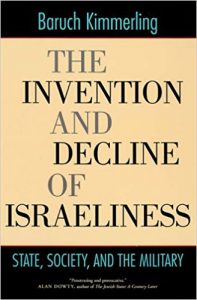The Invention and Decline of Israeliness

State, Society, and the Military
Reviewed by Rbeecca Kook, Project Muse, 2001, part-review (University of California Press, 2001, 268 pps.)
“Kimmerling’s latest analysis of Israeli society is timely and important. Although as this review was being written Israelis had yet to go to the polls, the most important outcome [End Page 182] of the elections to the 16th parliament (Knesset) was known well before the voting booths closed down.”
“This outcome was that neither one of the two “major” parties—Likud and Labor—will be able to garner enough support to form a stable, ruling coalition. Whether Shinui—the liberal, militantly secular center to right-wing party—or Shas—the ultra-orthodox Sephardic party—emerged as the third largest party, the writing was on the wall many months before the election: Israeli society is on a spiraling crash-course towards fragmentation. Gone is the “communal bonfire.” Gone are the days when one and then two parties dominated the political scene, and stability, so we thought, was ours forever. Gone are the days when “Israelis”—while separated by political positions—were seemingly united by a shared vision of what “Israel” is, and should be. Gone, to use Kimmerling’s terms, are the days of “hegemony.”…
“The story that Kimmerling tells is one of regeneration and decline; the construction of a unified cultural and political dominance, and its gradual replacement by a multitude of alternative cultures and subcultures. The book incorporates a socio-historical analysis of Israeli society and the Israeli state. Kimmerling provides, however, as he usually does, an alternative history, one that is absent from the more mainstream history and sociological textbooks….This process has resulted in a fragmented society, with multiple cultural identities, but lacking, according to Kimmerling, a unifying multicultural ideology as an organizing principle.” (more…)
